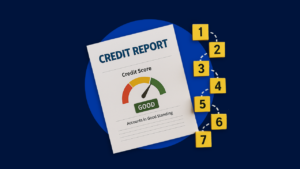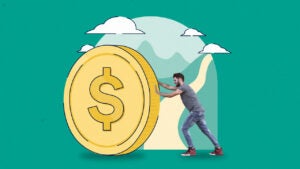What to do when you’re about to pay off debt



If you’re close to paying off your debt, congratulations!
Your dedication to paying down your balance will offer you some more financial freedom and one less monthly payment to worry about.
Before and after you send the final check to your creditor, there are a few things you’ll want to consider. These steps will make the payoff process easier, help prevent you from taking on further debt and prepare you for the future financially once your balance is paid off.
Confirm your final payment amount
When you make your final debt payment, you’ll want to confirm the amount you’ll be paying and that it will zero out the balance. There are a few ways to do this.
If you’re making a final fixed payment and your loan has been amortized, your final payment should be the same as your previous payments. You should be able to confirm the final payment and balance with your lender by calling them or checking your online account.
If you’re making a final payment that pays off the balance in a lump sum, you’ll also want to confirm the balance to ensure your final payment is correct. Some lenders will offer a “pay in full” option over the phone or online, allowing you to pay the remaining balance all at once.
If you’re working with a debt relief company, you’ll likely be informed when you’re approaching the end of your repayment timeline. A representative can help you confirm the final balance and payment amount and inform you of the next steps.
In all cases, once you make your final payment, you’ll want to confirm the balance has been paid off afterward and halt any automatic payments you’ve made through your bank.
Finally, you’ll want to ensure the payment goes to the correct place. Be wary of scams or wire transfer fraudsters who may solicit you to pay off your loan over the phone or email. When making your final payment, ensure the website or phone number is legitimately connected to your lender and not a phishing link.
Get receipts
When you’ve made your final payment, you’ll want to confirm that it has gone through and that the final balance has been paid off.
Once you’ve paid, request a receipt for the payment amount. Some lenders will allow you to take a screenshot or send a confirmation email that the final payment has been submitted. Keeping electronic and paper copies of these documents can help you if something goes wrong with the payment.
It may take a few days for the payment to process, whether it’s an online payment, a bank transfer or a check. Keep an eye on your bank account to make sure the correct amount has left and that your payment has reached the correct destination.
Some banks may call to confirm the payment before they allow it to go through, especially if you are paying off a large balance.
Once the final payment has been received, your lender will send you a confirmation of the loan payoff. This can come in the form of a loan payoff letter, a cancellation of promissory note or another form of confirmation.
If you don’t receive any notice or confirmation, you should contact your lender and make sure the balance is paid off. Having a confirmation of payoff is important in case you’re contacted by your lender or debt collectors in the future.
Plan your next steps
Paying off your debt offers you the financial freedom to dedicate your former payments to other uses. However, you shouldn’t let your budget go by the wayside. Instead, you can repay your debt to further your other financial goals.
Staying in the habit of budgeting and tracking your expenses can help you stick to your goals and control your spending, which can help prevent you from going into debt again.
While you can use your former debt repayment to spend on discretionary expenses or to stretch out your budget, you can also use it to contribute to your savings.
If you don’t already have one, your top priority should be establishing an emergency fund with about three to six months’ worth of essential expenses.
Afterward, you can start saving for goals such as a down payment on a house, a vacation or catching up on your retirement contributions. Like paying off debt, having a goal and timeline in mind can help you make decisions that further your progress and give you a goal to work toward.
Check in on your credit report
Once you’ve paid off your debt, you’ll want to pay attention to your credit report and how the repayment process has impacted it. Keeping your credit score up can help you qualify for loans and credit cards in the future, as well as keep your interest rates and other expenses low.
Paying off debt can cause your score to dip temporarily. When you pay off an account, it’s removed from the accounts used to calculate your credit mix. Closing an account that’s several years old can also lower the average age of your accounts.
Certain steps and factors in the repayment process can also impact your credit score. If you consolidated or refinanced your loans, the hard inquiry will have lowered your credit score by a few points. Closing a credit card can also impact your utilization ratio negatively.
Missing one or more payments or having a debt go into collections can significantly negatively impact your credit score and stay on your credit report for up to seven years.
If your credit score isn’t where you want it to be, you can increase it in a few ways.
In the long run, paying off your debt will boost your credit score with a history of on-time payments. After the balance is paid off, you can take out a low-interest credit-building loan to help build up a positive payment history.
Another option is to take out a secured or low-limit credit card and pay off the balance in full each month, increasing your credit mix and improving your payment history.
Make a plan to manage future debt
Once you’ve paid off your debt, you may be tempted to close all your credit cards and refuse to take out a loan again. However, it’s important to remember that borrowing money can be crucial in building wealth and achieving your financial goals, so long as you approach debt responsibly.
Avoiding “bad” debt — such as credit card debt or debt that doesn’t help you invest in the future — is key to approaching debt strategically. Paying off your credit card balance in full and keeping your spending in check can help you avoid bad balances like high-interest credit card debt.
Having an emergency fund can also help you avoid using a credit card or loans to pay for an unexpected expense.
With good debt, it’s important to weigh the pros and cons to ensure you’re taking out a loan for the right reasons.
Buying a house or taking out a home renovation loan can allow you to build equity and increase your net worth, for example. A student loan can help you fund an education that will increase your salary and improve your job prospects, while a business loan can help you invest and grow your business.
It’s also important to approach debt with an end goal in mind. If you factor the monthly payment into your budget, you can see how you’ll balance it with your regular expenses. It will also ensure you can pay each month without a financial squeeze.
While avoiding debt altogether may feel like the best option, approaching debt with the mindset, habits, resources and tools to pay it off — and to leverage your debt to increase your wealth — can help you take out loans strategically and avoid your debt from getting out of control.
Celebrate!
In the whirlwind of payment confirmation, budgeting, credit reports and focusing on future financial goals, it’s important to step back and celebrate your accomplishment of paying off your debt.
No matter the reason behind your debt, the balance, the interest or the length of the payoff timeline, paying off your balance takes dedication and responsibility — both of which will serve your finances well in the long run.
Take the time to enjoy the financial freedom from being debt-free, and use the skills and resources you picked up in your debt repayment journey to build toward your future.
If you want to learn more about managing your finances, mental health and debt repayment plan, check out Bankrate and National Debt Relief’s ongoing article series about all things debt. Watch this space for tips, tricks and exclusive stories from readers like you and their debt repayment journeys.
Why we ask for feedback Your feedback helps us improve our content and services. It takes less than a minute to complete.
Your responses are anonymous and will only be used for improving our website.







